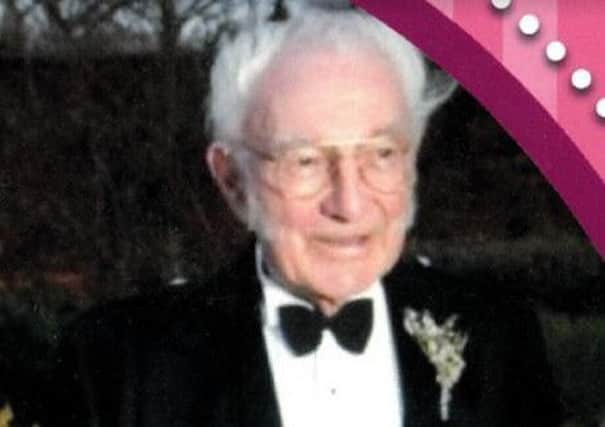Obituary: Bill Loggie, Normandy veteran, office manager, chairman of Highlands and Islands NVA


Lying in trench just outside Caen in the summer of 1944, Bill Loggie was initially unaware it was a significant date in his short life.
The young bombardier had just taken part in the Normandy landings, arriving on D-Day plus one on Juno beach with a contingent of Canadian troops.
Advertisement
Hide AdAdvertisement
Hide AdThe Canadians had already suffered hundreds of casualties in the initial stages of Operation Overlord, the Allied invasion of German-occupied Western Europe, and Loggie, while waiting his turn to disembark, had lost several comrades to friendly fire.
As the soldiers edged inland, the battle for Caen had taken much longer than anticipated. The German Panzer divisions’ resistance had been underestimated and fierce fighting over several weeks resulted in appalling casualties. Loggie was dug in in the trench when he heard someone casually mention the date, 13 July. It was only then he suddenly realised it was his 21st birthday.
Sixty years later, after learning he was to receive the Legion d’Honneur, France’s highest decoration, for helping to liberate the country, he recalled that moment in the ditch: “I said happy birthday to myself – nobody else was there – and I just got on with it.”
Caen would not be fully liberated for another week and Loggie would go on to serve in Belgium, Holland and Germany, eventually becoming chairman of the Highlands and Islands branch of the Normandy Veterans’ Association, a group supporting those who survived the carnage on the beaches and in the countryside as they fought to free nations from Nazi tyranny.
Loggie grew up in Aberdeen, attending the city’s Woodside Primary School and Robert Gordon’s College where he excelled in maths and arithmetic. But, as the elder son he was expected to earn a living as soon as possible and, despite his obvious academic ability, left school to work as a clerk with the Caledonian Milling Company in Aberdeen.
Called up in 1942, when he was just 18, he joined the 60th Regiment, Royal Artillery as a bombardier and was involved in radar tracking. Following the momentous D-Day landings, he fought his way through Europe witnessing scenes of death and destruction that stayed with him. One experience in particular, when he came across the sole survivor from an entire village reduced to rotting corpses, never left him.
He also found himself leading comrades through a minefield, miraculously navigating a safe path while armed only with a metal rod as a makeshift detector.
In contrast, he experienced great kindness and gratitude from those they were liberating. On one occasion, while towing a gun carriage and desperately seeking food, a French shopkeeper offered them the only thing in the village – Calvados. The unintended consequence of that generosity was that the brandy and empty stomachs did not mix and the vehicle and troops took a wrong turn and ended up in a ditch, unaware they were perilously close to German lines.
Advertisement
Hide AdAdvertisement
Hide AdOne beneficial result of his war, however, was that he became fluent in Dutch and German and for many years kept in touch with families who had befriended him on his journey.
Demobbed in 1947, he returned to Aberdeen and began work with Shell Mex, marrying his wife Margaret the following year and moving to Huntly with their children Derek and Liz in 1951. He worked in office administration in Rothiemay and Dyce, near Aberdeen, before becoming office manager of Sim’s in Huntly, a footwear wholesaler and retailer. He also became a well known voice in the area while working evenings as an operator at Huntly telephone exchange.
His retirement, from 1988, was equally busy as he became heavily involved as secretary and then chairman of the Highlands and Islands branch of the Normandy Veterans’ Association (NVA), organising meetings and arranging veterans’ trips to Normandy and elsewhere.
He travelled to Normandy for the 60th anniversary of the D-Day landings in 2004 and then following year he was presented with the Legion d’Honneur at the French Embassy in London.
But by the 65th anniversary of successful assault on the beaches of northern France, the number of the Highlands and Islands branch members had dwindled so low that it was decided to wind up the organisation locally. He was among the last surviving veterans who gathered in Dingwall to march together for the final time. Their colours were laid up and their standard presented to Highland Council for custody and display. Nationally, the NVA was disbanded in 2014, on the 70th anniversary of the Allied invasion.
A dedicated and unassuming family man, Loggie also devoted his time to caring for his wife, who died in 1990, and later to supporting his partner Jess, with whom he found renewed happiness, until her death five years ago. Ever practical, no doubt as a result of the privations of the war, he lived life without fuss, helping others. He thought nothing of driving through the desolate countryside in a blizzard at 2am to fix his daughter’s central heating and perpetually included a roll of parcel tape in family Christmas presents because it would “always come in handy”.
Also predeceased by his son Derek, he is survived by daughter Liz, who cared for him latterly, three grandchildren and two great grandsons.
ALISON SHAW